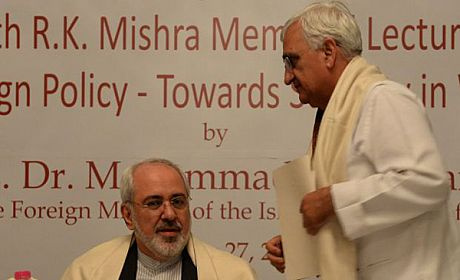Iran, India Need Road Map

The most important areas of cooperation between Iran and India can be described in the economic, energy, cultural, security and defense, and not necessarily political, fields. Therefore, during the past eight years, India had become one of the significant economic countries for the import of agricultural products and Iran’s oil. But the same elements created certain challenges for Iran. These challenges were affected by the relations between India and the US which, under US pressures, created economic obstacles for Iran. Can it really be said that the Indian policy-makers absolutely prefer the US over Iran?
Following the imposition of the sanctions, India’s policy with regard to the economic issues slowed down. Prior to that, cooperation existed between Iran and India. This cooperation was even seen on the issue of Afghanistan before and after September 11th. But these dialogues did not continue in regional issues. Therefore, it is hoped that, with the coming to power of the new administration, these relations would develop for Iran and India have many common points. On one hand, Iran and India complement each other in economic issues. India has a thirst for energy and Iran has one of the biggest reserves of energy. At the same time, natural convergence exists between the two countries. For example, the Peace pipeline was on the agenda of two administrations which unfortunately stopped due to the lack of a long-term perspective between the two sides. It was an opportunity which could develop economic relations and help in the fight against radicalism between Iran, India and Pakistan. This issue is affected by the relations between India and Pakistan and also with other countries. Pakistan is under the pressure of the western countries and Saudi Arabia and India also has the same situation. Nevertheless, if India is interested in becoming a regional player, it must bring part of its regional policies closer to the existing realities. Just imagine if Iran, India and Pakistan become an economic bloc; they will be the biggest economy of the region and could also be a link between Europe and East Asia. This issue could be to the benefit of the people of the region. Right now, 30000 Iranian students study in India. There are also 40 institutes in India which teach the Persian language. Thus, the two countries have numerous capacities and possibilities for cooperation which the people could benefit from.
In his meeting with Mohammad Javad Zarif, Salman Khurshid called Iran a country which could impact the peace and stability of the region and mentioned the relations between the two countries as a historical partnership which should play important roles in regional issues. But once again India’s Foreign Ministry has refused to name Iran as a country whose tourists would not need an entry visa. Why does India pursue such an approach?
The issue of a strategic partnership is correct but serious determination must exist for the advancement of this matter. Although Iran is faced with some problems, it could remove the obstacles in the long run. Furthermore, I do not suppose that the western countries would oppose any closeness between Iran and India. Nevertheless, there are other problems which must be removed. For example, right now the process of issuing a visa for a tourist takes 4 months. Perhaps there are some considerations in this regard but these small cases could be resolved so that both sides would be able to benefit from their capacities and achieve their objectives. Perhaps the main problem is the lack of concentrated policy in the relations between the two countries. It means that the relations between Iran and India have not been the top priority and this might also be due to certain special problems.
India must separate its relations with Iran and the US. How could India maintain a balance between its relations with these two countries?
From the aspect of national interests, this issue needs efforts and negotiations. Iran and India could, alongside each other, play significant roles in the region. Balancing this issue is not very difficult. It only needs political determination. Part of India’s long-term interests are related to its regional relations and particularly relations with Iran. This is also due to the administrative similarities and the historical relations between the two countries. The ground is also prepared. Relations between the people of both countries have also prepared the natural ground. Iran could provide the sources of energy, transport and vital corridors which India needs and Iran could be India’s gateway for export to, for example, Russia.
It seems that the relations between Iran and India are based on the geopolitical realities which are imposed on India’s Foreign Ministry. Now, how could Iran benefit from this opportunity to develop its relations with India so that India could continue to be a US ally while having independent relations with Iran?
Both Iran and India are more or less interested in having independent relations with other countries but no practical steps have been taken to draw a road map based on which the obstacles would be recognized and removed. Serious measures should be taken in this regard. During Mr. Khatami’s presidency, a comprehensive document was prepared. Based on this document and during the course of negotiations and on the grounds of diplomacy, the problems in the area of travelling between India and Pakistan were resolved but other problems were created about which the two parties could not negotiate on strategic issues. This is also related to the domestic developments in Iran and India. When there are talks of regional cooperation, these considerations could be set aside. I do not assume that the problem lies in relations between India and the US; instead, a part of India’s problems is related to its relations with some of its neighbors especially Pakistan and China. These are India’s considerations.

